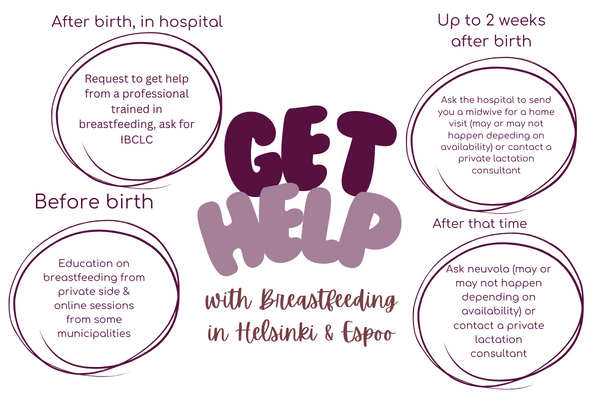Finding breastfeeding help in Helsinki (and surrounding areas) is a common concern among families. Navigating the Finnish healthcare system can be a bit like a maze, so let’s delve into some essential information today about accessing timely and expert support for breastfeeding in the Helsinki metropolitan area.
Does Helsinki’s public healthcare provide breastfeeding support?
Yes, BUT.
In public healthcare systems, including those in Helsinki, you may encounter (as I did) a common issue: receiving advice from various professionals with differing levels of expertise in breastfeeding. This could range from a nurse to an obstetrician/gynecologist to a midwife or general practitioner. Some may lack specific training in breastfeeding, while others might be relying on outdated knowledge acquired decades ago. The challenge arises when you receive conflicting advice from different professionals across various healthcare settings, leaving you unsure which guidance to follow.
Here’s a tip I always emphasize in my “Getting Ready for Breastfeeding” course and during one-on-one consultations: always inquire about the credentials of the person providing advice. It’s your right as a customer of the public healthcare system to seek clarity and assurance. Just as you wouldn’t accept heart-related advice from a liver specialist, similarly, you should seek specialized support for postpartum concerns, including breastfeeding.
How to Get Breastfeeding or Lactation Help in Helsinki or Espoo Neuvola
Before accessing neuvola services, it’s essential to consider your options at the birth hospital. Based on my experience as a private lactation consultant, I‘ve found that advice from lactation expert midwives in HUS hospitals is generally reliable. Birth hospitals in Helsinki and Espoo are mandated to provide breastfeeding assistance for up to two weeks after birth.
However, experiences may vary, with some clients receiving limited help (a visit without follow-ups) or even facing denials. My advice? Advocate for the service you deserve, even if it means making repeated requests.
Following the initial postpartum period, neuvola becomes a primary source of support. While I encourage seeking neuvola assistance and clearly communicating your needs as new parents, I must acknowledge that the quality of advice from neuvola professionals can be inconsistent. This inconsistency ranges from up-to-date, helpful guidance to outdated information or inadequate emotional support, often compounded by limited consultation time.
Private Breastfeeding Support in Helsinki
Exploring private options alongside public healthcare services is advisable. Private support can come in various forms:
- Mom-to-Mom/Parent-to-Parent groups, such as those offered by Imetys Tuki or The Nest Doulas Wednesday “Motherhood Talks,” provide valuable peer support free of charge.
- Lactation consultants, like myself, offer personalized assistance based on extensive training and certification. My services and pricing are transparently available on my website.
- IBCLCs (International Board Certified Lactation Consultants) are healthcare professionals specialized in breastfeeding support and lactation management. I often refer clients to IBCLCs for complex cases, similar to how I would refer to ENT doctors for specialized concerns.

A Note on Chestfeeding or Induced Lactation
For individuals seeking support for chestfeeding or induced lactation, especially within the LGBTQ+ community or non-gestational parents, it’s crucial to acknowledge potential gaps in the Finnish public healthcare system’s knowledge and resources. I strongly recommend consulting experts early in your pregnancy or once you’ve decided to pursue chestfeeding to ensure comprehensive support.
Final Word: Addressing Cultural Gaps and Emotional Support in Breastfeeding Consultancy
In conclusion, if you’ve sought support from the public healthcare system in Helsinki and still feel the need for additional assistance, know that you’re not alone. There can be cultural gaps between healthcare providers and clients, resulting in feelings of being unheard or unsupported. It’s okay to seek the help you feel you need and deserve. Your well-being and that of your baby are paramount, and you have the right to advocate for the support that meets your needs.
